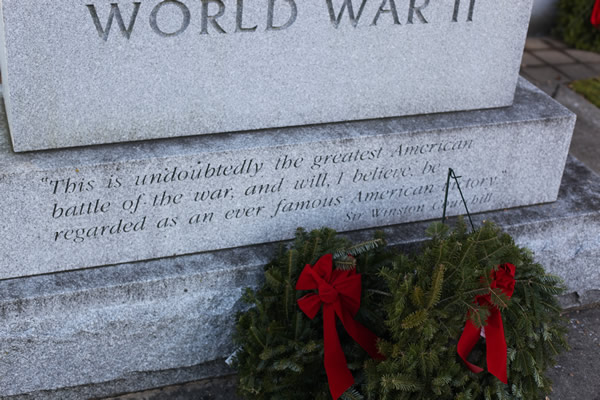The Battle of the Bulge Monument at the Valley Forge Military Academy and College prominently displays a quote from Winston Churchill (1874-1965), “This is undoubtedly the greatest American battle of the war, and will, I believe be regarded as an ever famous American victory.” Although inspiring, this is not the full quote or the full story.

Churchill, a master of the English language, chooses his words carefully and the quote seemed odd or at least incomplete. The use of “American” twice in the sentence gives the appearance of overcompensation. After some digging, it turns out the sentence is not complete and in its entirety reads, “Care must be taken in telling our proud tale not to claim for the British Army an undue share what is undoubtedly the greatest American battle of the war, and will, I believe, be regarded as an ever famous American victory.” ((Robert Rhodes James, ed., Winston S. Churchill: His Complete Speeches, 1897-1963, Vol. VII, 1943-1949 (New York: Chelsea House Publishers, 1974), 7095.))
To understand it fully, some context of the quote is helpful. On January 18, 1945, while the battle was still raging, Churchill gave a lengthy speech and answered questions on the floor of the House of Commons. For any of you that have had the pleasure of watching the British version of C-SPAN, members of the Commons will freely interrupt and interject questions while the Prime Minister speaks. Churchill’s focus was on the situation in Greece, not the Battle of the Bulge. He carried his speaking and responses until a lunch break.
It was after lunch that Churchill finally turned to what he described as “the main battlefront of the war.”
I have seen it suggested that the terrific battle which has been proceeding since 16th December on the American front is an Anglo-American battle. In fact, however, the United States troops have done almost all the fighting and have suffered almost all the losses. They have suffered losses almost equal to those on both sides in the battle of Gettysburg. Only one British Army Corps has been engaged in this action. All the rest of the 30 or more divisions, which have been fighting continuously for the last month are United States troops. The Americans have engaged 30 or 40 men for every one we have engaged, and they have lost 60 to 80 men for every one of ours. That is the point I wish to make. ((Ibid.))
With that, he emphasized the quote that appears on the monument.
Churchill then stroked the sensibilities of his fellow Brits by pointing out losses they suffered in earlier battles. He then moved onto how both the Brits and Americans have provided reinforcements to cover these losses. Knowing that his words were public, he wanted to “let the Germans dismiss from their minds any idea that any losses or set-back of the kind we have witnessed will turn us from our purpose. We shall go on to the end, however the storm may beat.” ((Ibid., 7097)) Churchill then revealed that he believed the Germans had overplayed their hand, believing “that the decisive breaking of the German offensive in the West is more likely to shorten this war than to lengthen.” ((Ibid.)) This was the complete opposite of Hitler’s original intent for the offensive.
In a crude sort of way, Churchill welcomed the German attacks. “Harsh as it may seem to say, a terrible thing to say in dealing with our own precious flesh and blood, it is our interest and the American interest that the whole Western front, and the air everywhere at all possible flying times, should be in continuous action against the enemy, burning and bleeding his strength away at every opportunity and on all occasions, if we are to bring this horror to an end.” ((Ibid.))
Finally, Churchill summarized his position on the Battle of the Bulge, “The Germans have made a violent and costly sortie which has been repulsed with heavy slaughter, and have expended in the endeavour forces which they cannot replace, against an enemy who has already more than replaced every loss he has slaughtered.” ((Ibid., 7098))
The war in Europe was one of attrition and Germany was losing.
